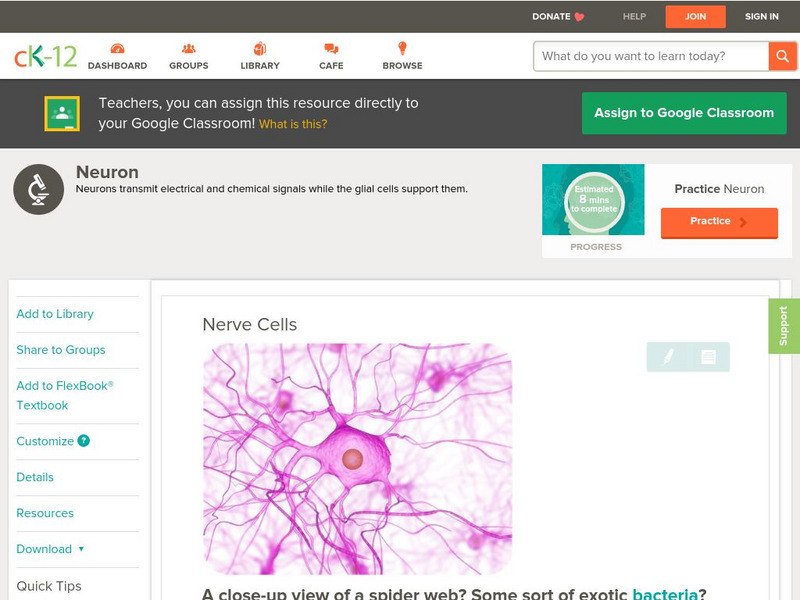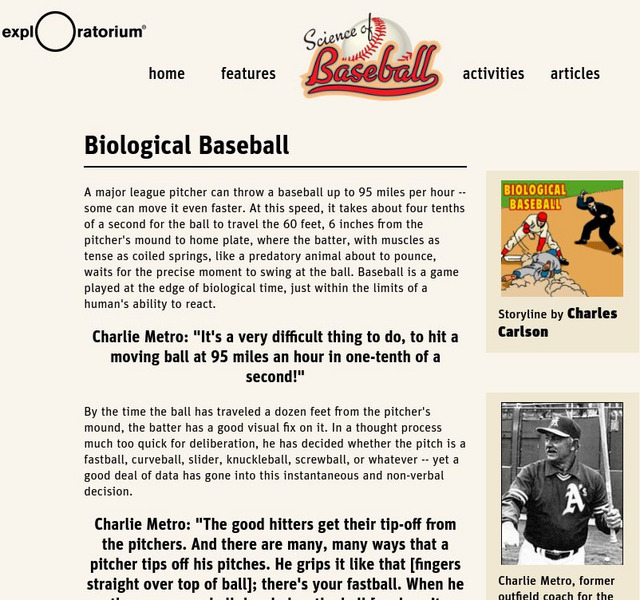Hi, what do you want to do?
Curated OER
Neuroscience for Kids: Drug Effects on Nervous System
Discusses the effects of many drugs on the brain and other parts of the body. This large neuroscience resource also provides links to information on other brain and nervous system topics.
Curated OER
Neuroscience for Kids: Drug Effects on Nervous System
Discusses the effects of many drugs on the brain and other parts of the body. This large neuroscience resource also provides links to information on other brain and nervous system topics.
Curated OER
Neuroscience for Kids: Drug Effects on Nervous System
Discusses the effects of many drugs on the brain and other parts of the body. This large neuroscience resource also provides links to information on other brain and nervous system topics.
Curated OER
Neuroscience for Kids: Drug Effects on Nervous System
Discusses the effects of many drugs on the brain and other parts of the body. This large neuroscience resource also provides links to information on other brain and nervous system topics.
Curated OER
Neuroscience for Kids: Drug Effects on Nervous System
Discusses the effects of many drugs on the brain and other parts of the body. This large neuroscience resource also provides links to information on other brain and nervous system topics.
Curated OER
Neuroscience for Kids: Drug Effects on Nervous System
Discusses the effects of many drugs on the brain and other parts of the body. This large neuroscience resource also provides links to information on other brain and nervous system topics.
PBS
Pbs Learning Media: Tools to Be More Present With Students
How we can be in the parasympathetic "rest and digest" state of our nervous system or the sympathetic "fight or flight" at any given moment. In both cases, we can only operate in one or the other brain networks at any given moment. Here...
Curated OER
Spinal Cord Neuron Relationships
Class notes on The Nervous System - Spinal Cord and Peripheral Nerves.
Curated OER
Structure of a Nerve
Class notes on The Nervous System - Spinal Cord and Peripheral Nerves.
Curated OER
Univ. Of Washington: Neuroscience for Kids
"Created for all students and teachers who would like to learn more about the nervous system," this extensive University of Washington site offers information, resources, games, and activities galore. Offers dozens of links to related...
Curated OER
Univ. Of Washington: Neuroscience for Kids
"Created for all students and teachers who would like to learn more about the nervous system," this extensive University of Washington site offers information, resources, games, and activities galore. Offers dozens of links to related...
Curated OER
Nerve Roots
Read the anatomical components of the spinal cord and their function in the nervous system. Includes labeled diagram. Outstanding information and a helpful aid for understanding.
CK-12 Foundation
Ck 12: Biology: Nerve Cells
[Free Registration/Login may be required to access all resource tools.] Describes the structure and types of neurons.
Other
University of Cincinnati Biologist Finds Differences in Lizard Locomotion
This site from the University of Cincinnati explains how biologist Bruce Jayne has studied the lizard nervous and muscular systems to discover finds that may uncover evolutionary trends.
Other
Nerves Homepage
A page leading to everything you ever wanted to know about nerves of the hand. Nice graphics and some interesting material.
Exploratorium
Exploratorium: Science of Baseball: Biological Baseball
Younger students learn that hitting a baseball requires the use of various brain to body reaction activities and how those compare to the instincts and actions of animals.
Wikimedia
Wikipedia: Slime Mold
Wikipedia provides several paragraphs of information on slime molds, members of the Protista kingdom. Includes image.
Other
March of Dimes Medical Reference: Tay Sachs Disease
The March of Dimes Foundation offers a general overview of Tay-Sachs disease and how it is transmitted, carried, and treated.
Khan Academy
Khan Academy: Reducing Pain With Morphine
Practice for the MCAT with these questions about morphine.
PBS
Pbs Teachers: Changing Your Mind: Increasing Brainpower
Investigate the brain and it's connections - the number of possible routes along which a brain message might travel - by solving and creating geometric progressions. Conduct an experiment to learn about stimulus and response.
Famous Scientists
Famous Scientists: Charles Sherrington
Learn about Charles Sherrington, the Nobel Prize winner in Physiology or Medicine for his work on the functions of neurons.
American Academy of Family Physicians
Aafp: Update on Parkinson's Disease
This article, presented by the American Academy of Family Physicians, discusses recent breakthroughs in the treatment of Parkinson's Disease. Included are tables and graphs.
Khan Academy
Khan Academy: Syndrome of Inappropriate Antidiuretic Hormone
Read the passage Syndrome of Inappropriate Antidiuretic Hormone and answer the five-question quiz that follows.














